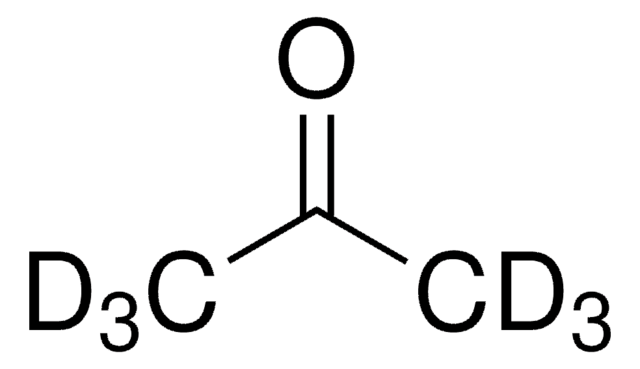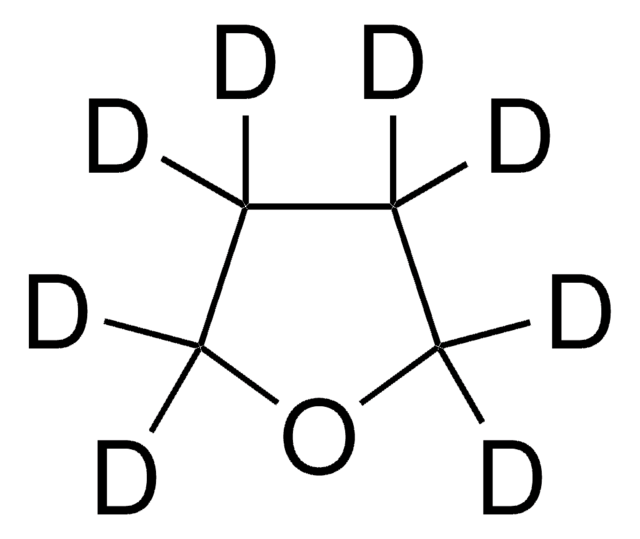1.00021
Acetone-D6
deuteration degree min. 99.9% for NMR spectroscopy MagniSolv™
Synonyme(s) :
Acetone-D6, Hexadeuteroacetone
About This Item
Produits recommandés
Pression de vapeur
233 hPa ( 20 °C)
Niveau de qualité
Forme
liquid
Température d'inflammation spontanée
465 °C (DIN 51794)
Puissance
5800 mg/kg LD50, oral (Rat)
20000 mg/kg LD50, skin (Rabbit)
Limite d'explosivité
2.6-12.8 % (v/v)
Technique(s)
NMR: suitable
Impuretés
≤0.020% Water (H<SUB>2</SUB>O) (NMR)
≤0.030% Water (H<SUB>2</SUB>O + D<SUB>2</SUB>O) (Karl Fischer)
pH
5-6 (365 g/L in H2O)
Point d'ébullition
56.2 °C/1013 hPa
Pf
-95.4 °C
Température de transition
flash point <-20 °C
Densité
0.88 g/cm3 at 20 °C
Température de stockage
2-30°C
InChI
1S/C3H6O/c1-3(2)4/h1-2H3/i1D3,2D3
Clé InChI
CSCPPACGZOOCGX-WFGJKAKNSA-N
Description générale
Application
- Studying Cation Exchange in {Cr(7)Co} Pseudorotaxanes: Preparatory Studies for Making Hybrid Molecular Machines.: This study focuses on understanding the cation exchange process in pseudorotaxane structures, utilizing Acetone-D6 for NMR spectroscopy to characterize molecular interactions and movements within these hybrid molecular machines (Winpenny REP et al., 2024).
- Poly(sulfobetaine)-Based Diblock Copolymer Thin Films in Water/Acetone Atmosphere: Modulation of Water Hydration and Co-nonsolvency-Triggered Film Contraction.: This research highlights the influence of Acetone-D6 in studying hydration and structural changes in polymeric films under varying environmental conditions, providing insights into the dynamics of hydrophilic and hydrophobic balances in diblock copolymers (Müller-Buschbaum P et al., 2022).
- Profiling and quantification of aminophospholipids based on chemical derivatization coupled with HPLC-MS.: The use of Acetone-D6 in derivatization processes enhances the profiling and quantification of aminophospholipids, crucial for understanding lipid metabolism and interactions (Chen H et al., 2019).
- Capturing Guest Dynamics in Metal-Organic Framework CPO-27-M (M = Mg, Zn) by (2)H Solid-State NMR Spectroscopy.: Utilizing Acetone-D6, this study explores the dynamic behavior of guests in metal-organic frameworks, contributing to the design of materials with tailored porosity and functionality (Huang Y et al., 2016).
- Urinary profiling of cis-diol-containing metabolites in rats with bisphenol A exposure by liquid chromatography-mass spectrometry and isotope labeling.: This research employs Acetone-D6 in a novel isotopic labeling approach to enhance the detection and profiling of metabolites, providing valuable insights into the metabolic pathways affected by bisphenol A exposure (Cai Z et al., 2016).
Remarque sur l'analyse
Water (NMR, H₂O): ≤ 0.020 %
Performance test (NMR-spectrum): passes test
Water (K. Fischer, H₂O + D₂O): ≤ 0.030 %
Produits recommandés
Informations légales
Mention d'avertissement
Danger
Mentions de danger
Conseils de prudence
Classification des risques
Eye Irrit. 2 - Flam. Liq. 2 - STOT SE 3
Organes cibles
Central nervous system
Risques supp
Code de la classe de stockage
3 - Flammable liquids
Classe de danger pour l'eau (WGK)
WGK 1
Point d'éclair (°F)
-2.2 °F - closed cup
Point d'éclair (°C)
-19 °C - closed cup
Certificats d'analyse (COA)
Recherchez un Certificats d'analyse (COA) en saisissant le numéro de lot du produit. Les numéros de lot figurent sur l'étiquette du produit après les mots "Lot" ou "Batch".
Déjà en possession de ce produit ?
Retrouvez la documentation relative aux produits que vous avez récemment achetés dans la Bibliothèque de documents.
Les clients ont également consulté
Notre équipe de scientifiques dispose d'une expérience dans tous les secteurs de la recherche, notamment en sciences de la vie, science des matériaux, synthèse chimique, chromatographie, analyse et dans de nombreux autres domaines..
Contacter notre Service technique







